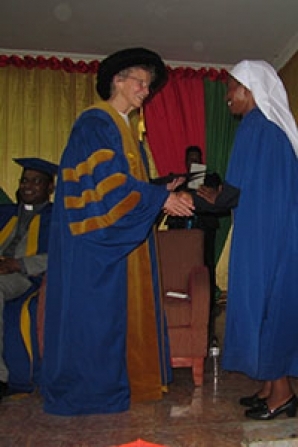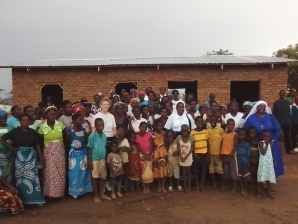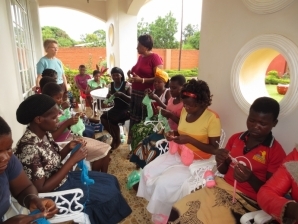
Kathryn Miller, SSJ, Ph.D., assistant to the president for administration and special projects, made her third trip to Africa in December. Representing the ASEC (African Sisters Education Collaborative) Board of Directors, she visited ministries and spoke at the graduation ceremonies of sisters from ASEC’s SLDI (Sisters Leadership Development Initiative) in Malawi and Zambia.
During her time in Africa, Sister Kathryn visited three ministry sites, all of which are administered by the graduates of the ASEC-SLDI programs. Her first stop was in Malawi and a faith-based organization called Tikondane, which translates into “let us love one another.”
Developed in the 1990s as a result of a growing number of children living on the streets of Lilongwe, Tikondane’s mission is to protect these children from the streets, support them so they may develop to their full potential and love them in such a way they otherwise may not have experienced.
“They are doing wonderful work keeping these children off of the streets and helping to prevent them from being trafficked,” says Sister Kathryn. “People are there to counsel them, to talk to them, to really let these children know there is a safe place they can come to if they are abandoned, scared or orphaned.”
One of Sister Kathryn’s favorite parts of visiting Tikondane, in addition to hearing the stories of those working with the children, was seeing the large murals painted on the walls.
“There were about 10 of these murals, all of which the children helped paint, presenting lessons on such topics as seeking help when they are hurt or frightened, running away from traffickers, and doing chores that are helpful so that they might not be put out of their homes," she says.

The second site visit took place in one of the many villages where the sisters are implementing the Community Kitchens Initiative. Here, Sister Kathryn observed as women involved in the program demonstrated their food products, all with the goal of being able to use their locally available resources, hygiene and sanitation, to make nutritious foods for the children to eat.
“The goal is to prepare food products that incorporate as many of the food groups as possible," she says. "For example, instead of giving children dried potato skins, it becomes something more. If they have milk or an egg they add it as a source of calcium and protein."
As Sister Kathryn notes, this is an amazing ministry but it is also one that is seeing tangible results, as the number of children hospitalized or dying from malnutrition has decreased over the past several years.
The final site visit was to the Chipapa Community of the Holy Rosary Sisters. Located in the remotest part of Zambia, more than 12 kilometers away from the nearest road, 2,000 residents of a small village community have been taught to grow crops, keep bees, gather milk, bake, sew and much more. The community also has a primary school and several other buildings funded by grants written by the sisters of the SLDI program. Grant writing is one of the many skills these sisters learn in their administration and finance programs during their SLDI schooling.
“Just like at the nutrition kitchens, the sisters truly are developing the land they were given, with the little they had to start with, and turning it into this beautiful community, and it is just that in the truest sense of the word, a community,” says Sister Kathryn.

None of these programs would have been possible without the involvement of ASEC and the Hilton Foundation grants which have supported the cause and mission of educating women religious throughout Africa.
Since its inception, ASEC has graduated 2,100 women religious. Approximately 160 of them graduated during the ceremonies at which Sister Kathryn spoke.
“The skills acquired by the sisters do not end with the individual sister, but rather, they are tools for service to their congregations, dioceses, communities, society and the people of God,” she said in her address. “You are now among graduates who have mentored approximately 6,000 individuals and who have touched the lives of thousands more. Wherever you are in ministry, you are changing lives, one at a time.”
Also in her address to the graduates, Sister Kathryn mentioned some of the future initiatives for ASEC, including the plans that are in place to train an additional 1,800 sisters in the SLDI program between 2016 and 2018.
“Looking back at the growth of ASEC since its inception, I recall the week-long presentations, discussions and recommendations shared by 14 African Sister-Leaders regarding the need for education of the sisters. ASEC board members were inspired, and we committed ourselves to move forward to fulfill the dreams of that time,” Sister Kathryn says. “In just a decade, that dream has come true.”
— Marilee Gallagher ’14
This story originally appeared in the February 2016 issue of Connections.



